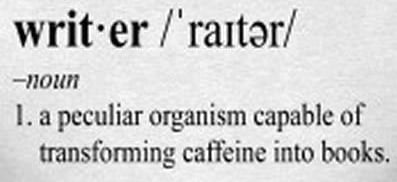 Yesterday I hit a huge milestone in my writing life, I finished the first full draft of my manuscript of a book that will soon be looking for a publishing home (anyone want to talk to me about it?). When I hit the print button and saw the huge stack of papers that I'd produced (yes, me! I did that!) a wave of shock came over me. One leg of the marathon is over. I just couldn't believe I'd made it this far! Sure, there will be revisions after revisions left to make, but over 80,000 words on a page is a great start-- especially as I wrote most of it while having another full-time job and of course keeping up with the demands of regular life.
Yesterday I hit a huge milestone in my writing life, I finished the first full draft of my manuscript of a book that will soon be looking for a publishing home (anyone want to talk to me about it?). When I hit the print button and saw the huge stack of papers that I'd produced (yes, me! I did that!) a wave of shock came over me. One leg of the marathon is over. I just couldn't believe I'd made it this far! Sure, there will be revisions after revisions left to make, but over 80,000 words on a page is a great start-- especially as I wrote most of it while having another full-time job and of course keeping up with the demands of regular life.
All of this is to say, I'm in awe of the art of writing and others who are with me on this journey.
I'm thankful as always for the support and editorial feedback of the WritingRevs-- some amazing pastoral ladies who are also working on projects of their own. Have you read Sabbath in the Suburbs or Chasing the Divine in the Holy Land? You should.
And, I'm also grateful for the larger writing community that I'm a part of-- friends who I've met on twitter who sign their tweets #iamwriting or #writing who help me remember this solitary work is most of all a community building exercise.
I'm grateful for colleagues I've made in others phases of my life who have gone before me as authors. Knowing them and watching their process helps me know that I could do it too.
One of these colleagues is Alan Rudnick. Alan and I were in a clergy group together back in our associate pastor days in Maryland. I worked at Alan's home church while he served at nearby Methodist congregation. Then, we both started solo pastorates at the same time and it has been fun to watch the progression of his ministry. He's recently completed his book with Judson Press called The Work of the Associate Pastor. It's a comprehensive collection of essays and helpful suggestions for both churches and pastors about how the ministry of an associate fits into the larger vision of the church. Looking for a book about church staff dynamics? Check it out.
Another one of these colleagues is J. Dana Trent. Dana and I were in the same class at Duke Divinity School, as part of the Baptist House of Studies program. Now, Dana is married to Fred, a former Hindu monk. She recently completed her first book called Saffron Cross: The Unlikely Story of How a Christian Minister Married a Hindu Monk which will come out in October 2013 through Upper Room Books. Dana lives the kind of life of writing, spiritual direction, teaching and ministering that inspires me on this non-traditional path I'm on, and I'm so excited to see where this publication takes her in the future. I know you will too-- I mean, who would have thought: a Baptist and an Hindu? I'm sure it will be a page turner!
Bottom line: if you want to write a book, you must make friends with people who are doing the same.
In my journey toward becoming an author, I've found it important to build community with other writers. Not only because these are the type of folks whom I really want to read my own work (because they provide such helpful feedback), but for the sake of having encouragers for the journey. Other writers, for me, really do know what makes me tick in ways others don't. I am spurred on by their love of our shared craft.
Several months ago now, I was invited to join a group of fellow Writing Revs who live in the DC region. This group meets a couple of times a month to read each other's stuff and talk about writing. Of course, I was intimidated at first, but after spending a week at Collegeville Institute last summer, I knew it would be good for me. And, I'd have to just get over any insecurities I might have. I'd experienced the gift (and the terror too) of a writing workshop for the first time. And, while it is incredibly vulnerable to put yourself out there like that-- "Here, be the first eyes to my work. Tell me what you think"-- I learned my readers would thank me later. And, it has been fun to regular meet with other pastors who feel the same way.
Two of the group members of this Writing Rev group are soon to publish their first book. Excitement has been all the buzz with us lately and I couldn't help but take this opportunity for a shameless promotion for these friends. The church needs thoughtful thinkers and MaryAnn and Ruth are two bright lights with some really great stuff to say on Sabbath and pilgrimage. I've read their books and I'm thrilled about you reading them too.
 Sabbath in the Subburbs: A Family's Experiment with Holy Time by MaryAnn McKibben Dana is available for pre-release on Amazon right now. It officially comes out on September 30th.
Sabbath in the Subburbs: A Family's Experiment with Holy Time by MaryAnn McKibben Dana is available for pre-release on Amazon right now. It officially comes out on September 30th.
Books on Sabbath are easier to find these days. For, slowing down, stopping and finding ways to get out of the rat race seems to be a topic that we all want to talk about. But how many of us actually do it? This book is a journey alongside a family with two working parents, three kids in a very overcommited region of the country to find such rest on a weekly basis. You'll find thoughtful theological reflections over the course of this family's year-long journey with practical ideas about how they put their faith into practice.
Chasing the Divine in the Holy Land by Ruth Everhart is also available for pre-order right now. It comes out on November 30th.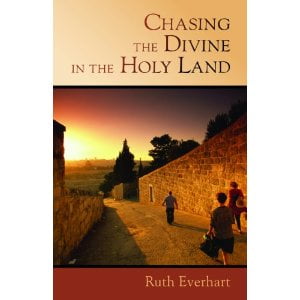
Many pastors or other serious faith seekers come to the Holy Land in search of something. But what happens when such an adventure begins to shake the foundations of your faith? What happens when you begin to see the life experiences of others in a way that you didn't expect? What happens when you wrestle with such deep life questions that you come home from the Holy Land with new vision for the world? Ruth explores these questions and more as she takes you a long for the journey that she a several colleagues made to Israel several years ago. Join her for the spiritual journey.
Both books will ready and available for spring study groups of all kinds. Order yours today and support these wonderful writing Rev friends of mine! You can thank me later.
In our consumer driven everything culture, we often treat reading as just another thing to conquer, to finish, to master. In seminary, we marked our progress by how many textbook were on our shelves. Colleagues ask me at conferences, "How many books have you read lately?" Congregants ask me: "What books can you teach us more about?" I've often fallen into the trap of reading just to be done with something or just to teach something. And then, that is it. I cast the book aside.
Not all words written down on a page are meant to be treasured (fluff beach reading, for example). However, sometimes words do hold lasting power. And just need us to pick them up again to find the gems.
I've found myself doing a lot of re-reading lately instead of picking up new texts. Books can be like old friends, coming back into our lives to provide comfort or simply reminding us who we are. And I think this is true of fiction and non-fiction alike.
 Several years ago, I picked up at a fall DC library book sale a copy of Renita J. Weems's memoir, Listening for God: A Minister's Journey Through Silence and Doubt. How surprized I was to find this book! Though I was not going through a season of doubt at the time, the title sucked me in. Seemed like an honest text (I'm always looking for these) worth the dollar price tag (what a steal!).
Several years ago, I picked up at a fall DC library book sale a copy of Renita J. Weems's memoir, Listening for God: A Minister's Journey Through Silence and Doubt. How surprized I was to find this book! Though I was not going through a season of doubt at the time, the title sucked me in. Seemed like an honest text (I'm always looking for these) worth the dollar price tag (what a steal!).
I was familar with the author's name. Weems, a preacher, scholar and formerly a professor at Vanderbilt University, also wrote, Battered Love which I read in my Women, Theology and the Church class at Duke Divinity.
That September, I remember speed reading through it, feeling so happy as if I'd found a long-lost soul sister. Weems, coming out of a conservative tradition that didn't necessarily affirm her gifts for ministry, writes about her struggle to stay connected to spiritual wisdom, even as her well ran dry and her faith shifted. After finishing it, I was quick to recommend it to friends (as I usually do when a treasure is found) and put it on my shelf again in the "has read section." I didn't touch it for years.
However, in picking it up again this summer, I've read slower. I've stopped myself to process some of her nuggets of truth in short chunks. I haven't rushed. And, yesterday, I came across this reflection about the meaning of dreams which was perfectly instructive to my life right now. I keep having the most vivid dreams in color and in details that I can actually recount in the morning. And, I hoped for some wisdom to begin to make sense of them. And so how perfect that Weems wrote:
Wherever dreams come from, and I don't pretend to know where that is, it's a place within each of us, down within our souls, a place that won't take no, shut up, not now, you again? for an answer. It's a place that demands our attention and resolves to get it, whether with laughter or terror. It's a place within which insists that we remember the lives we have lived, says Frederic Beuchner. It calls us to remember memories emotions, remember moments, remember things we've tried furiously to avoid or to forget. Dreams beckon us into a still room within us where it is safe to remember where our journeys have brought us. It's safe because it is safe because it's a place where we can face our fears, anger, and dread and see them for what they were and are: feelings that needn't last forever. It is safe because no one , God is has access to that room, save you and God. And there in that room filled with our greatest anxieties, God meets us and beckons, "Come, it is time to be healed."
Each time a dream has enough current in it to awaken us, God is speaking to us through some chamber within us, beckoning us to come in. It's time. It's time to remember. It's time to lighten up. It's time to sort through. It's time to heal. It's time to let go. It's time to learn how to laugh at ourselves.
Thank you Renita Weems. I'm thinking more about some recent dreams of mine as I ponder your words, hoping that as you say they might lead to more healing in me and others too.
You see, sometimes, reading can be the gift that keeps on giving.
“I realize what a strange in-between place I am in. The Young Woman inside has turned to go, but the Old Woman has not shown up.”
― Sue Monk Kidd
“I've tried to shield myself from life and inhabit my own small, safe corner; but there's no immunity from life.”
― Ann Kidd Taylor
“I realize I'm trying to work out the boundaries. How to love her without interfering. How to step back and let her have her private world and yet still be an intimate part of it. When she talks about her feelings, I have to consciously tell myself she wants me to receive them, not fix them.”
― Sue Monk Kidd
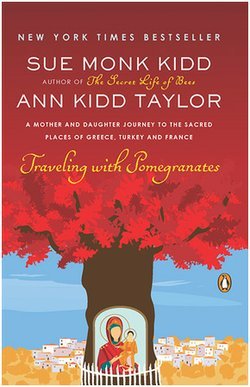 Such were some of my favorite quotes from the book I finished about a month ago called Traveling with Pomegranates: A Mother-Daughter Story. Traveling is a book that gives its readers a snapshot into the relationship shared between Sue, the mother in her early 50s and Ann the daughter a recent college as they both navigate through life transitions. And as they do so, figure out what the next step of their relationship with one another might be as well.
Such were some of my favorite quotes from the book I finished about a month ago called Traveling with Pomegranates: A Mother-Daughter Story. Traveling is a book that gives its readers a snapshot into the relationship shared between Sue, the mother in her early 50s and Ann the daughter a recent college as they both navigate through life transitions. And as they do so, figure out what the next step of their relationship with one another might be as well.
I was first introduced to the author Sue Monk Kidd almost 10 years ago during a time in my life when my theology was in transition. A friend passed along the book, Dance of the Dissent Daughter. It was a time in my life I really had no idea what feminist theology was all about. At that time, reading this text opened my eyes to many of the oppressive male imagery in scripture and in Christian tradition. This book became a conversation tool, among many others, that helped me say "yes" to the serious study awaiting me in seminary. I wanted to figure out how female images of the divine fit into (or not) what I had already been taught about God.
So, being a fan, I was eager to see what Sue Monk Kidd"s latest memoir had in store for its readers, but this time with chapters from her daughter, Ann. And though the book felt emotionally intense at times (as if you are literally reading their journals), with breaks for thought and reflection, I paged through it quickly and soon passed my copy on to a friend. As a budding writer myself, I appreciated the call story both Sue and Ann experienced in their travels to write and the call to write together. Their journey of renegotiating boundaries, passion, relationships and hope read very authentically to me. I believe the experiences of many women are found in these pages-- just with different details. And, I left my experience of reading it as any good book does-- as if I'd made new friends that I hoped would share more of their story with me one day.
Most of all Traveling with Pomegranates made me think about these bigger picture things:
1. The desire in all of us for deeper relationship with "mother" and "daughter" figures in our lives as women. We are never too old to want a mother or a daughter in our lives.
2. The importance of shared wisdom passed on between the generations even as differing of perspectives make it hard for us to relate sometimes.
3. The joy that rises from the gift of travel. Sometimes it takes us getting out of our normal environment to really see our lives as they really are.
4. Doing with your life what is a "necessary fire" within us, not just what pays the bills.
5. Courage to not just do things the way they've always been done. Who says we are not the one to blaze a new trail?
6. The difficulty we all have of saying "no" when this "no" comes at the cost of what others expected from us. We are pleasing creatures. But if want our soul to live, we must break free of the obligations and the shoulds.
7. Writing takes time and drafting and more drafting as well as being with other writers. The more you get into writing, the more you realize you the only way to get better is to write more. And some more.
Anyone else read this text and want to chat about it?
Next up tomorrow: In the Santuary of Outcasts by Neil White
I don't know if it is my new addiction to the Kindle app on my IPad or just the season of spring, but I've been on a reading kick lately of some really wonderful titles that I think many of you, blog readers, might like too. So, I've decided to devote the next five days to informal book reviews and reflections.
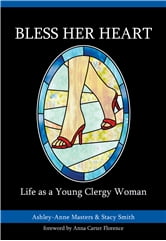 And first up today is a newer release especially for those of you who are young clergy women or want to know a young clergy woman in your life a little bit better. Bless Your Heart: Life as a Young Clergy Woman by Ashley-Anne Masters and Stacy Smith is a e-book I downloaded and completed over the weekend.
And first up today is a newer release especially for those of you who are young clergy women or want to know a young clergy woman in your life a little bit better. Bless Your Heart: Life as a Young Clergy Woman by Ashley-Anne Masters and Stacy Smith is a e-book I downloaded and completed over the weekend.
I'd remembered fellow female clergy, especially friends from the Young Women's Clergy Project, excitedly promoting this title when it came out more than a year ago. A colleague's Facebook status read of her enthusiastic praise of the text saying something like, "Finally there is a book about someone who understands me!" So, I sat down to see what all the hype was about.
I was a little disappointed in the style of the book-- all stories came in the first person but we never knew who "I" was. (And so, I had trouble following if the stories shared were of the authors or of other clergy they interviewed said). And, really felt like the scripture sections of the chapters were a big too simplistic for the topics. But, overall, I am glad this book was written and I'm so thankful to the authors for taking up this task.
I couldn't help but recall as I read, several of my own stories about clothing, dating and what it means to have a social life as young clergy woman. And with each recollection, this book helped me grow in gratitude for my own journey. Though there have been hard times of misunderstandings, lack of respect and "How in the world could YOU be the pastor?" I know I'm in exactly the right vocation.
No matter how times have changed, almost all of us female clergy, like Smith and Masters write, have stories about comments on "inappropriate shoes," "not being in the office long enough to the tastes of the secretaries" or "honey, you are as cute as my granddaughter." This book read to me like a testimony that while we as young clergy women might have different tastes in footwear, Sabbath keeping or hair color than our male or even older female colleagues, we still are clergy, gifted and eager to learn as we serve. So many of the stories told within speak to a growing edge in young women must climb in their efforts to claim their authority, exude confidence and individual style in a religious world that wants us to conform, and balance family and work roles. We all are a work in progress, no matter our age or gender!
I also became grateful because of how much less "green" I feel now in my soon to be 6th year of ordained ministry. I have grown much over these past six years, especially during my tenure at Washington Plaza, a place where I have been lovingly supported by church leadership, given opportunities to experiment, and always taken seriously as a spiritual leader (no matter my age).
If there is anything I would want to share with my young clergy women sisters after reading Bless Your Heart, it would be, keep going. This is what I know: it will get better. Not necessarily better because societal attitudes about young clergy change, or all senior pastors suddenly become instantly supportive of maternity or family leave or that because all young clergywomen who want jobs find them. But as we stick around the ministerial life, we change. Our voice becomes stronger. Our focus becomes clearer. And our ability to let go "all of those stupid things" people say to us quickens. No matter what kind of ministry space we find ourselves in, we know who we are and we know who we serve and who we don't! So the next time an elder says to us "Bless your heart" we smile with our hands held high and say back "bless yours too!"
Next up: Traveling with Pomograntes by Sue Monk Kidd
. . . a writer like Anne Lamott
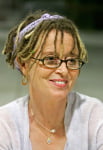 She recently said this about writing: "I try to write the books I would love to come upon, that are honest, concerned with real lives, human hearts, spiritual transformation, families, secrets, wonder, craziness — and that can make me laugh. When I am reading a book like this, I feel rich and profoundly relieved to be in the presence of someone who will share the truth with me, and throw the lights on a little, and I try to write these kinds of books. Books, for me, are medicine."
She recently said this about writing: "I try to write the books I would love to come upon, that are honest, concerned with real lives, human hearts, spiritual transformation, families, secrets, wonder, craziness — and that can make me laugh. When I am reading a book like this, I feel rich and profoundly relieved to be in the presence of someone who will share the truth with me, and throw the lights on a little, and I try to write these kinds of books. Books, for me, are medicine."
------------------------------------------------------------
Like Lamott these are the kinds of books I like to read, and I've been dreaming one day to write too. I want to use my writing to cut to the heart of the way things really are. I want to encourage readers to have hope. I want to touch the depth of the human experience that somehow connects us all.
For my first full-length project I've got six chapters down and who knows how many to go? And revisions after revisions after revisions to go.
This is what I promise you future readers: each time I sit down to write I will tell the truth the best I can. Such is a scary writing proposition, but I know in the end it is going to be good. The draft after draft nights will be worth it. I just know it!
 Yesterday, I got this email from the ADAMS Center (All Dulles Area Mulism Society) in Sterling, Virginia of which Washington Plaza Baptist is a friend. As you might remember last January, Kevin and I traveled to Israel in support and friendship of Imam Magid of ADAMS.
Yesterday, I got this email from the ADAMS Center (All Dulles Area Mulism Society) in Sterling, Virginia of which Washington Plaza Baptist is a friend. As you might remember last January, Kevin and I traveled to Israel in support and friendship of Imam Magid of ADAMS.
What troubles me most about this email is that the state of religion in our world in general is that this email needed to be sent at all. We assume that every Muslim is the same, that every Jew is the is same, and that every Christian is the same. And, thus, when one Jew, Christian or Muslim acts up, all people of that religion are to blame. I am proud to have friends in these faiths and others and support all well-meaning religious devotees . And, I want to add my name to the list of those who love and support my Muslim friends.
Washington Plaza Baptist along with Oakbrook Church and Northern Hebrew Congregation will be hosting an Interfaith meeting, talking about the book, The Faith Club, on January 18th at 7 pm. Our friends at ADAMS have agreed to host. It will be a great chance to continue to grow in friendship and peace so that more of these emails don't need to be sent in the future!
In the Name of God, The Compassionate, The Merciful
The All Dulles Area Muslim Society (ADAMS) condemns the terrorist crimes against humanity in the Christmas Day attacks on Christians Churches in Madalla, Jos, Kano, Damaturu and Gadaka in Nigeria. Our hearts, thoughts and profound sympathies are with all the victims of these horrific acts, and with their families. We urge the Nigerian government to take all measures to prosecute all those responsible for these heinous crimes, swiftly and to the fullest measure. We pray for peace between the Muslim and Christian Community in Nigeria, and must work together to help bring about that peace, and an end to terrorism, extremism and conflict.
We are especially troubled by these events since ADAMS had in October hosted an Interfaith event featuring two Nigerian interfaith icons, Imam Muhammad Ashafa and Pastor James Wuye, two former Nigerian militia leaders turned peace-makers who have spent several years trying to bring an end to such warfare and conflicts in their home country (http://www.adamscenter.org/announcements/The__Imam__and__the__Pastor)
"It is a sad day for all people when a simple act of worship or community celebration is marked by violence and innocent deaths", said Imam Magid, ADAMS' Executive Director. "We therefore ask all Muslim community members and organizations in Nigeria to lend support to the families who lost loved ones during these attacks, and we urge American Muslims to join them in praying that God may ease the suffering of all those affected by this terrible tragedy."
As Islam holds the human soul in high esteem, we consider any attack against innocent human beings to be a grave sin. ADAMS has consistently and clearly stated that those who commit acts of terror, murder and cruelty in the name of Islam are not only destroying innocent lives, but are also betraying the values of the faith they claim to represent. No injustice done to Muslims can ever justify the massacre of innocent people, and no act of terror will ever serve the cause of Islam. ADAMS and all its members therefore repudiate and dissociate ourselves from any Muslim group or individual who commits such brutal and un-Islamic acts. We refuse to allow our faith to be held hostage by the criminal actions of a tiny minority acting outside the teachings of both the Quran and the Prophet Muhammad, Peace Be Upon Him.
PEACE,
Rizwan Jaka
Board Member & Interfaith/Government/Media Committee Co-Chair, All Dulles Area Muslim Society(ADAMS)
The pastoral life like any other profession, I believe is an art form. To practice it is to create: to explore the unknown deep waters of life through practice, mistakes, more practice and more mistakes and hopefully come out with something beautiful on the other side.
One of the best things I do to stay grounded in the art of pastoring is befriend and stay in close friendship with a couple of pastors who I know are on a similar journey of growth as pastoral artists. Though something as simple as going to lunch regularly with other Revs or finding moments in our hectic schedules to remain an important part of each other lives, I make my membership in an artistic community.
To foster this type of togetherness, sometimes we just talk about what is going on in our lives (you know even pastors need a pastor), sometimes we attend church or denominational functions together, sometimes we get our nails done together (the female pastor friends types). In these get-together ideas are shared among us. "Hey, what are you preaching on for Advent?" Or, "Have you ever taught a book study on this topic?" And, new practices for ministry are brought up, "What if our congregations did this together?" or "Have you ever considered partnering with this para-church group?" And then there is the all important question: "What books are you reading right now?"
But, there are some books I can't read with other pastors. In fact, I refuse to read them as much as I want to be respectful of the interests of my colleagues.
I won't read books that are poorly written or come from a tradition that do not affirm my existence as a female pastor. There's so much I have to learn from those I first respect, so good to start there, right? And, I won't read books that have prescriptive ideas of a one-size fits all approach to ministry.
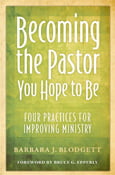 Recently in a clergy meeting, we decided to read the book: Becoming the Pastor You Hope to Be recently published by the respected Alban Institute. Even though I suspected this volume would be one of those that I didn't like very much, I picked it up and tried to read as much as I could. And after 50 or so pages I really wanted to throw it across the room. It all seemed like well-meaning, but scripted advice. For to be told the four things you need to do to be a good pastor is like giving a kid you think has the talent to be a good artist a paint-by-number kit and saying: "There's your training."
Recently in a clergy meeting, we decided to read the book: Becoming the Pastor You Hope to Be recently published by the respected Alban Institute. Even though I suspected this volume would be one of those that I didn't like very much, I picked it up and tried to read as much as I could. And after 50 or so pages I really wanted to throw it across the room. It all seemed like well-meaning, but scripted advice. For to be told the four things you need to do to be a good pastor is like giving a kid you think has the talent to be a good artist a paint-by-number kit and saying: "There's your training."
Churches like paintings, are made up of unique people, settings and histories, so to give advice in this way to its leaders-- though some of it may be good common sense-- is to assume that all of this uniqueness doesn't matter. It assumes that doing ministry in an urban setting in Washington DC in a Baptist church is the same as doing as ministry in a rural setting in Wyoming in a Catholic parish, which of course just doesn't work.
If we truly see ourselves as pastor artists, then, I think some expanding our horizons is in order. There is not really a church growth plan in a box that is going to teach us everything we need to know to run "good" or "successful" churches. Artists after all become more creative and interesting the more they create outside the normal boundaries and experiment.
 Recently, I read a quick page turning novel, which did more for my creative life than any "how to" volume could. Cutting for Stone follows the lives of two boys from birth to adulthood, growing up with adoptive doctor parents in Africa and is full of unexpected twists, turns and vivid scenes that made me feel like the characters were actually friends of mine. Deep in the story are truths about the human condition of pain, loss, jealousy, and redemption. It was a mine of diamonds for the pastoral life that I'm still mulling over even though I finished it weeks ago.
Recently, I read a quick page turning novel, which did more for my creative life than any "how to" volume could. Cutting for Stone follows the lives of two boys from birth to adulthood, growing up with adoptive doctor parents in Africa and is full of unexpected twists, turns and vivid scenes that made me feel like the characters were actually friends of mine. Deep in the story are truths about the human condition of pain, loss, jealousy, and redemption. It was a mine of diamonds for the pastoral life that I'm still mulling over even though I finished it weeks ago.
With encouragement from my clergy friends, a bookshelf full of novels and other "non churchy" books, I'm going to keep reading and experimenting with this life I've been called to lead. Though today feels like one of those "blank canvas" type of days, I hope that by the time my work is through for the day I'll have some creative ideas to what might be coming next . . .
When people ask me what my hobbies are, I usually feel quite lost. I'm not sure exactly what to say because I don't naturally gravitate toward activities that seem hobby worthy (getting pedicures just doesn't count does it?). But, there is one thing I always do regularly-- even as dorky as it may be-- and that is reading. My life just doesn't seem in balance if I don't have something or somethings ready to go on my night stand. It is hard to pack for vacation sometimes because I simply do not have luggage space for all the books!
I've stumbled upon a few great ones lately that I thought might be worthy to share here with blog readers. Most are prose that have inspired me to think or re-examine what I believe about something-- my favorite type of books instead of just the fluffy entertainment driven novels (for me, this is what tv is for). If you've read any of these and have a strong reaction for or against in someway, I'd love to hear more about it.
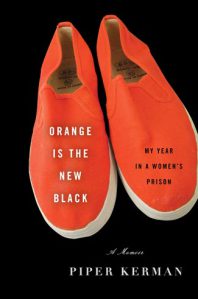 1. Orange is the New Black: My Year in a Women's Prison by Piper Kerman
1. Orange is the New Black: My Year in a Women's Prison by Piper Kerman
"With a career, a boyfriend and a loving family, Piper Kerman barely resembles the reckless young woman who delivered a suitcase of drug money ten years before. But that past has caught up with her. Convinced and sentence to 15 months at the infamous feral correctional facility in Danbury, Connecticut, the well-heeled Smith college grad is now inmate #11187-424 . . . "
After finishing this one, I found have new appreciation for the injustice and conditions of women's correctional facilities in our country. The humanity of women in prison, the stories that led them to be there, and the toil of their daily lives beyond bars captured me and I could hardly put this book down. Though we often what to tell the stories of prison of "bad people" vs. "good" this memoir breaks a part this stereotype and leaves it here for the entirety. I was inspired to think about how I might be involved in prison reform in the future and believed that this book would be a great text for a book club at a congregation discerning the beginnings of a prison ministry.
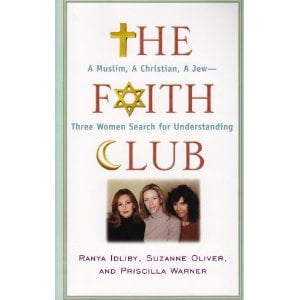 2. The Faith Club: A Muslim, A Christian, A Jew-- Three Women Search for Understanding by Ranya Idliby, Suzanne Oliver and Priscilla Warner
2. The Faith Club: A Muslim, A Christian, A Jew-- Three Women Search for Understanding by Ranya Idliby, Suzanne Oliver and Priscilla Warner
Though not a new book, with the 10th anniversary of 9/11 coming up, it is a great one to pick up for it is a story that began out of this tragedy. Three women, mothers, of different faiths wanted to get together to write a children's book about tolerance and peace in the wake of how the events of 9/11 forever changed the city of New York, where each lived. However, as soon as they began to meet to begin to work on the project, they learned that there was no way they could work together if they did not know each other first. And, thus began a series of Interfaith conversations that became this book.
This text is one that a group of us from Oakbrook Church, Northern VA Hebrew Congregation in Reston and the Adams Center in Sterling, VA along with folks from Washington Plaza are using to have an Interfaith conversation in our local community. We've met once already for our "faith club" gathering and look forward to more. If you are interested in joining this book club, let me know!
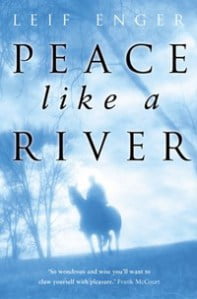 3. Peace Like a River by Leif Engler
3. Peace Like a River by Leif Engler
It's a novel and I normally stay away from novels, but really found myself drawn to the language and imagery of this one, especially after several of my colleagues at the Collegeville Institute recommended it several weeks ago-- many as their "favorite read" on the first morning of our group sharing.
"The novel is narrated by Reuben Land, an eleven-year-old boy suffering from severe asthma who lives with his unusual family in a small Minnesota town in 1962. His mother abandoned the family years before. He is among three children: his older brother Davy, who is sixteen years old when the story begins; and his younger sister Swede eight years old, and an imaginative writer and poet. His father, Jeremiah, a school janitor, is a man of faith who quietly performs miracles – one of which is to bring Reuben to life after his lungs failed to inflate when he was born. Reuben is the only one who ever sees or notices these miracles; he concludes that he is meant to be a witness to them."
And, this is just the beginning of the adventure . . . check it out.
4. Before and After Zachariah by Fern Kupfer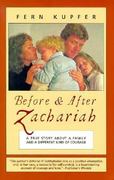
This is a book recommended to me by Sari, the writing tutor from my week at Collegeville. And ever since I started it, I just couldn't put it down. The vivid language and emotionally driven plot is captivating. Again, not a new book-- written in the 1980s in fact, but full of powerful insights for any going through a time in their life of pronounced pain and loss-- not only for who or what might have died, but for what is living and still is just not as it should be.
This mid-western family documents through the voice of Fern, the mom, the ups and downs of what it means to birth, raise and make decisions for the care of a severely mentally and physically challenged child. Questions of "when it is it time to institutionalize?" "how does a marriage survive such kind of care for another?" and "how do you parent a 'normal' child while taking care of such a 'abnormal' one too?" are raised in ways that the reader does not often expect. I was challenged to reconsider how I think about and care for parents and teachers I know who are caring for special needs children.
Does calling to a particular congregation automatically mean you are required to give your whole life to a particular group of people?
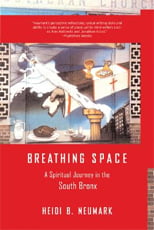 Recently, I finished a wonderful pastoral memoir called Breathing Space: A Spiritual Journey in South Bronx by Heidi Neumark. Heidi is a Lutheran pastor who writes about her 20ish year journey with a congregation in transformation in a neighborhood also in transition. Pastor Heidi lived in the neighborhood where she worked and full enmeshed herself and her family (husband and two children)-- worshipping, playing, and shopping in the blocks surrounding her church.
Recently, I finished a wonderful pastoral memoir called Breathing Space: A Spiritual Journey in South Bronx by Heidi Neumark. Heidi is a Lutheran pastor who writes about her 20ish year journey with a congregation in transformation in a neighborhood also in transition. Pastor Heidi lived in the neighborhood where she worked and full enmeshed herself and her family (husband and two children)-- worshipping, playing, and shopping in the blocks surrounding her church.
The journey Pastor Heidi described I found much kinship in, even though our settings are quite different. She arrived at a congregation without the physical, emotional or spiritual infrastructure for long-term survival. She was greeted, nurtured and sustained in her early years there by some amazingly faithful saints of God who inspired her to fully commit herself to the work at hand. She saw in her diverse faith community great potential.
While it was a beautiful journey to read about, I begged to ask myself the question on countless occasions while reading it, how in the world was this pace of life sustainable? And, it seemed that Pastor Heidi asks herself this question over and over again too; thus, the title of the book, breathing space.
Yet, there were points in the book where my heart stirred for her because it seemed that she was so close to finding the answers but just kept on working "for God."
Consider this, Heidi Neumark writes:
We had a German student, Bend, staying here and visiting the church for two months. At the beginning, he asked me about friendships in the parish and how it worked to maintain friendships in other places. I said that it was hard to do because most of our friends now lived at some distance, but that it didn't bother me at all. My work and my family were more than enough. When I said it, I believed it was true. But I remembered exactly what I was doing when he asked the question. I was standing at the sink washing pesto of the dinner plates. I remember the Brillo pad in my hands, the pieces of green pasta and bits of garlic stuck to the plates, the running water. I washed dishes countless time since then, but I can't remember one. I was fooling myself when I thought it was an easy question.
It is true that my work and my family fill my heart and occupy my days. . . . It was easy to become Bernd's friend because it was convenient. He was right there. When he left, I had to ask myself-- am I sad because Bernd is leaving or because another friend is moving out of reach? It was both. But friendship is not always, or at least in my circumstances, not usually convenient. (90-91).
Of course, friendship is not always convenient. It really isn't, and usually the things that are most life-giving to our souls aren't.
One of the biggest sins, I think, of those serving in pastoral ministry is regularly doing what is right in front of us. Someone need to go to coffee? I'm there. Someone in the hospital for the fifth time this month? Sure, I'll visit them again. Need someone to serve on this denominational board? Sure, I can go to those extra meetings. We just aren't good at saying, "No" or "Later."
I believe such practices are where we as pastors hide, under the banner of "the busyness of ministry." To this, I say, ministry is only as busy as we make it. Of course there are unexpected funerals. Of course there are unexpected building issues. Of course there is someone who needs to talk on a day when such is not scheduled. But, when we look at our calendars, as ministry leaders, are we intentionally making time for things that matter to us?
Are we finding breathing space through relationships outside of the church?
Are we talking time each week to remember we are always more than our jobs?
Are we finding more out about the people God has made us to be so that upon retirement we aren't just starring at the walls wondering who we are without the church to tell us?
The longer I read Pastor Heidi's memoir, the longer, I wished for her a long retreat with some of the dear friends that she mentions moving away. I wished for her a longer time a part each year from her church so to get an even great respect for its context. I wished for her peace, so not to feel as if she was carrying this burden of a church in transition alone.
Breathing space after all, I don't think just comes to us. We have to grow a place in our souls and calendars for it to live. And, how beautiful such space can truly be!